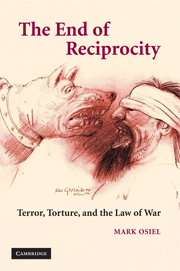Conclusion
Published online by Cambridge University Press: 05 June 2012
Summary
There are certain questions in political life for which the right answers are so clear, Bernard Williams once remarked that one would have to wonder about the moral character of anyone who found it necessary to pose them in the first place, to raise them even to the level of consciousness. The impermissibility of torture, extrajudicial killing, and sustained detention without trial was long comfortably considered such a question. Elaine Scarry could hence confidently pronounce in 1985, “An intelligent argument on behalf of torture” (i.e., worthy of careful refutation) “is a conceptual impossibility.”
Torture, in particular, has been an essentially uncontested concept within Western legal and political discourse for some centuries. There was near universal consensus that it is never justified or excused and that it would soon disappear entirely. If it was ever excused on grounds of necessity, its practice would be confined to the colonies and concealed. Today, by contrast, torture is very much contested, both its definition and its permissibility, largely as a result of U.S. policies in the conflict with Al Qaeda and kindred groups. According to Amnesty International and other reliable human rights organizations, there are more than one hundred countries in which the state regularly practices torture. But in essentially none of them is its defensibility publicly debated, much less endorsed. There are several countries, mostly in northwestern Europe, where torture is neither practiced nor debated as a conceivable policy option.
- Type
- Chapter
- Information
- The End of ReciprocityTerror, Torture, and the Law of War, pp. 390 - 398Publisher: Cambridge University PressPrint publication year: 2009

